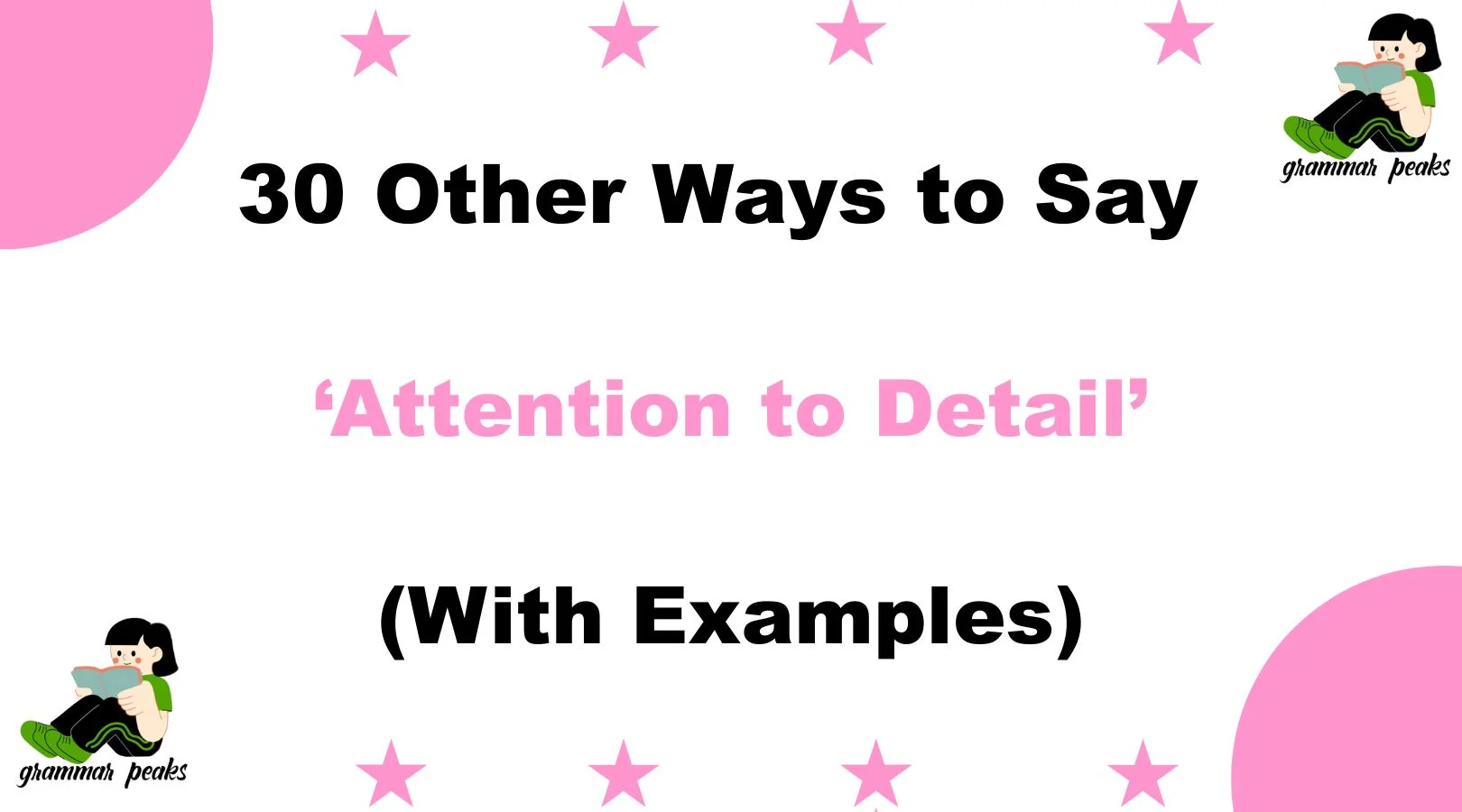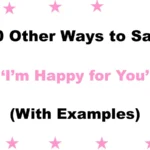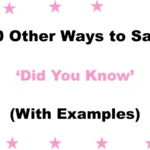In our daily conversations and professional lives, finding the right words to express care and precision can make a big difference. Saying “attention to detail” is common, but sometimes, you want to express this idea in a more thoughtful, nuanced, or personalised way. Using alternative phrases can help your message feel warmer, clearer, and more meaningful—whether you’re praising a colleague, writing a review, or describing your own skills.
This article offers 30 thoughtful alternatives to “attention to detail” with clear explanations, examples, and guidance on when and how to use each. Whether you want to sound formal, casual, or empathetic, you’ll find the perfect phrase to suit your needs.
What Does “Attention to Detail” Mean?
Attention to detail means carefully noticing and considering every small part of something to ensure accuracy, quality, or completeness. It involves being thorough, precise, and mindful of little things that others might overlook. This quality is important in many fields because it helps avoid mistakes and creates excellent results.
When to Use “Attention to Detail”
You can use attention to detail when you want to highlight someone’s carefulness or thoroughness. It’s great for work evaluations, project feedback, or when emphasizing the importance of precision in tasks like design, writing, or analysis. However, it’s best used when the focus is on accuracy rather than creativity or speed.
Is It Professional/Polite to Say “Attention to Detail”?
Yes, saying attention to detail is generally professional and polite. It shows respect for someone’s careful work and dedication. However, if overused, it can sound mechanical or impersonal. Using alternative phrases can soften the tone and make your appreciation feel more genuine and warm.
Pros and Cons of Using “Attention to Detail”
Pros:
- Clearly communicates thoroughness.
- Widely understood in professional settings.
- Highlights commitment to quality.
Cons:
- Can feel repetitive or generic.
- Might not fully capture creativity or passion.
- Could seem overly formal in casual contexts.
Synonyms for “Attention to Detail”
- Meticulousness
- Precision Focus
- Thoroughness
- Careful Observation
- Exactness
- Scrupulousness
- Diligence
- Fastidiousness
- Mindfulness
- Accuracy
- Close Examination
- Perfectionism
- Rigorousness
- Conscientiousness
- Deliberation
- Detail-Oriented Approach
- Methodicalness
- Attentiveness
- Thorough Scrutiny
- Rigorous Attention
- Keen Eye
- Painstaking Effort
- Scrutiny
- Vigilance
- Systematic Review
- In-Depth Analysis
- Exacting Standards
- Focused Observation
- Careful Inspection
- Nuanced Understanding
1. Meticulousness
Definition: The quality of showing great care and precision in handling details.
Detailed Explanation: Meticulousness means being extremely careful and exact in everything you do, often paying attention to the smallest elements to ensure perfection.
Scenario Examples: A graphic designer who adjusts every pixel until the design looks flawless demonstrates meticulousness.
Best Use: In contexts where precision and perfection are highly valued, such as design, editing, or craftsmanship.
Worst Use: In casual conversations, as it can sound overly formal or rigid.
Tone: Professional, respectful, and appreciative.
2. Precision Focus
Definition: Concentrating specifically on achieving exactness in every detail.
Detailed Explanation: Precision focus means being dedicated to accuracy, ensuring that no part of a task is overlooked or handled carelessly.
Scenario Examples: A scientist calibrating instruments to the smallest measurement to guarantee accurate results shows precision focus.
Best Use: Technical, scientific, or analytical work descriptions.
Worst Use: Creative fields where flexibility and broad thinking are needed.
Tone: Technical and serious.
3. Thoroughness
Definition: Completing tasks with careful attention to all parts and details.
Detailed Explanation: Thoroughness involves making sure everything is done fully and correctly, leaving nothing unfinished or unchecked.
Scenario Examples: An auditor reviewing every transaction to ensure accuracy exemplifies thoroughness.
Best Use: Professional or academic settings where completeness matters.
Worst Use: Situations requiring quick decisions or improvisation.
Tone: Reliable and diligent.
4. Careful Observation
Definition: Paying close and thoughtful attention to details.
Detailed Explanation: This means noticing important small things by observing carefully, often leading to better understanding or decisions.
Scenario Examples: A teacher noticing a student’s subtle confusion during a lesson demonstrates careful observation.
Best Use: Situations requiring empathy or learning from subtle cues.
Worst Use: When speed or decisiveness is more important.
Tone: Gentle and attentive.
5. Exactness
Definition: The state of being completely accurate and without error.
Detailed Explanation: Exactness highlights an emphasis on precision and correctness, leaving no room for mistakes.
Scenario Examples: An architect ensuring every measurement is exact to avoid construction issues shows exactness.
Best Use: Engineering, design, or legal work where precision is critical.
Worst Use: Flexible or creative tasks.
Tone: Formal and precise.
6. Scrupulousness
Definition: Being extremely careful to do things correctly and ethically.
Detailed Explanation: Scrupulousness reflects both attention to detail and strong moral principles.
Scenario Examples: A journalist fact-checking every statement for accuracy and fairness demonstrates scrupulousness.
Best Use: Ethical or sensitive work environments.
Worst Use: Fast-paced or informal settings.
Tone: Serious and conscientious.
7. Diligence
Definition: Careful and persistent work or effort.
Detailed Explanation: Diligence implies sustained and careful attention over time, ensuring nothing is overlooked.
Scenario Examples: An employee who constantly checks their work and meets deadlines shows diligence.
Best Use: Any professional or academic context valuing persistence.
Worst Use: When quick, light work is enough.
Tone: Respectful and encouraging.
8. Fastidiousness
Definition: Being very attentive to and concerned about accuracy and detail.
Detailed Explanation: Fastidiousness means having high standards and not settling for less than perfect.
Scenario Examples: A chef who insists on the exact balance of flavors is fastidious.
Best Use: Creative or quality-driven industries.
Worst Use: When flexibility is necessary.
Tone: High standard, exacting.
9. Mindfulness
Definition: Being fully present and aware of details and surroundings.
Detailed Explanation: Mindfulness is about conscious attention and awareness, often linked with calm and thoughtful behavior.
Scenario Examples: A healthcare worker noticing small patient changes demonstrates mindfulness.
Best Use: Care-related fields or personal development.
Worst Use: Fast-paced or impersonal tasks.
Tone: Calm, caring.
10. Accuracy
Definition: The quality of being correct and precise.
Detailed Explanation: Accuracy focuses on getting facts or measurements exactly right.
Scenario Examples: A translator ensuring every word is exactly right shows accuracy.
Best Use: Technical or data-driven tasks.
Worst Use: Casual or creative conversations.
Tone: Clear and professional.
11. Close Examination
Definition: Looking at something carefully and in detail to fully understand it.
Detailed Explanation: Close examination refers to the act of inspecting or reviewing something thoroughly to catch small or hidden elements.
Scenario Examples: A quality control specialist inspecting each item before it leaves the factory is performing close examination.
Best Use: When evaluating or reviewing work, reports, or processes.
Worst Use: When describing casual observations.
Tone: Professional, focused, and serious.
12. Perfectionism
Definition: A tendency to strive for flawlessness and set high standards.
Detailed Explanation: Perfectionism involves an unyielding attention to detail, often going above and beyond to avoid mistakes.
Scenario Examples: An editor revising a manuscript until it’s spotless reflects perfectionism.
Best Use: Creative or high-stakes work requiring high accuracy.
Worst Use: Contexts that value speed or experimentation.
Tone: Driven, ambitious, but potentially intense.
13. Rigorousness
Definition: Strict precision and attention to standards or rules.
Detailed Explanation: Rigorousness means working with high discipline, following processes closely, and avoiding shortcuts.
Scenario Examples: A scientist following a strict protocol for an experiment demonstrates rigorousness.
Best Use: Academic, legal, or technical fields.
Worst Use: Casual tasks or creative freedom zones.
Tone: Strict, intellectual, formal.
14. Conscientiousness
Definition: Wishing to do what is right, especially with great care and effort.
Detailed Explanation: Conscientiousness blends morality with care—doing a task thoroughly because it’s the right thing to do.
Scenario Examples: A social worker double-checking a client’s paperwork shows conscientiousness.
Best Use: Service, education, or ethics-related roles.
Worst Use: Routine or minor tasks.
Tone: Warm, responsible, thoughtful.
15. Deliberation
Definition: Carefully considering every aspect before acting or deciding.
Detailed Explanation: Deliberation implies a thoughtful approach where each step is taken intentionally after weighing options.
Scenario Examples: A manager planning a company shift with deliberation ensures smoother transitions.
Best Use: Strategic decision-making or leadership.
Worst Use: Time-sensitive or spontaneous actions.
Tone: Reflective, wise.
16. Detail-Oriented Approach
Definition: A method that focuses heavily on the small components to ensure quality.
Detailed Explanation: This phrase highlights a style of working where even the smallest part is treated with importance.
Scenario Examples: An event planner using a checklist to ensure every table has the right centerpiece is detail-oriented.
Best Use: Professional introductions or resumes.
Worst Use: Quick messages or casual praise.
Tone: Professional and self-promoting.
17. Methodicalness
Definition: Working in a systematic and organized way.
Detailed Explanation: Methodicalness shows a step-by-step, thoughtful process that ensures nothing is missed.
Scenario Examples: A data analyst working row by row through a spreadsheet shows methodicalness.
Best Use: Describing workflow or structure.
Worst Use: Describing creativity or intuition-based processes.
Tone: Organized, calm, and logical.
18. Attentiveness
Definition: The state of paying close and thoughtful attention.
Detailed Explanation: Attentiveness includes noticing both details and emotions, showing full mental engagement.
Scenario Examples: A teacher who notices when a student is struggling quietly is attentive.
Best Use: Empathetic roles or communication.
Worst Use: Technical fields where emotional awareness isn’t relevant.
Tone: Warm, observant.
19. Thorough Scrutiny
Definition: Careful and critical examination of every element.
Detailed Explanation: Thorough scrutiny involves actively looking for errors or problems with sharp attention.
Scenario Examples: A lawyer reviewing a contract line-by-line before approval is conducting thorough scrutiny.
Best Use: Legal, compliance, or review processes.
Worst Use: Casual observations or friendly feedback.
Tone: Intense, evaluative.
20. Rigorous Attention
Definition: Strict focus on detail, with no tolerance for error.
Detailed Explanation: This phrase emphasizes an unbending commitment to quality through intense observation.
Scenario Examples: A medical technician checking each test result for anomalies shows rigorous attention.
Best Use: Healthcare, research, or military.
Worst Use: Fun or laid-back contexts.
Tone: Serious and disciplined.
21. Keen Eye
Definition: A sharp ability to notice subtle or fine details.
Detailed Explanation: Having a keen eye suggests natural perceptiveness and the ability to spot things others might miss.
Scenario Examples: A photographer spotting the perfect lighting conditions shows a keen eye.
Best Use: Creative or visual fields.
Worst Use: Data or numbers-driven work.
Tone: Artistic, sharp, complimentary.
22. Painstaking Effort
Definition: Extraordinary care and effort taken to complete something.
Detailed Explanation: This phrase reflects intense focus and dedication to get every aspect right, often over a long time.
Scenario Examples: An artist spending days adding tiny brushstrokes is making painstaking effort.
Best Use: Describing hard, slow, careful work.
Worst Use: Quick or effortless tasks.
Tone: Respectful, admiring.
23. Scrutiny
Definition: Close and critical inspection or observation.
Detailed Explanation: Scrutiny implies careful examination with the intent to find flaws or confirm quality.
Scenario Examples: A hiring manager reviewing each application under scrutiny ensures a fair decision.
Best Use: Audits, reviews, and evaluations.
Worst Use: Casual or friendly feedback.
Tone: Critical, formal.
24. Vigilance
Definition: Keeping careful watch for possible errors or danger.
Detailed Explanation: Vigilance goes beyond attention to detail—it’s about staying alert at all times.
Scenario Examples: A lifeguard watching swimmers with vigilance ensures safety.
Best Use: Security, healthcare, or high-risk tasks.
Worst Use: Creative or relaxed settings.
Tone: Alert, cautious.
25. Systematic Review
Definition: A structured process of examining something thoroughly and methodically.
Detailed Explanation: This phrase is often used in academic or scientific fields to describe an organized way of analyzing data or findings.
Scenario Examples: Researchers conducting a systematic review of medical studies ensure reliability.
Best Use: Research, academics, or quality assurance.
Worst Use: Informal or day-to-day tasks.
Tone: Scholarly, analytical.
26. In-Depth Analysis
Definition: A deep, comprehensive look into every detail.
Detailed Explanation: In-depth analysis involves going beyond the surface to understand all aspects thoroughly.
Scenario Examples: A business analyst diving into sales patterns for trends is conducting in-depth analysis.
Best Use: Professional or academic reports.
Worst Use: Quick overviews or summaries.
Tone: Thorough, intelligent.
27. Exacting Standards
Definition: High expectations for precision and correctness.
Detailed Explanation: Someone with exacting standards demands excellence and accuracy in every task.
Scenario Examples: A chef expecting each dish to match a perfect recipe has exacting standards.
Best Use: Describing leadership or expert roles.
Worst Use: Low-stakes or informal tasks.
Tone: Demanding, authoritative.
28. Focused Observation
Definition: A concentrated effort to watch and analyze details.
Detailed Explanation: Focused observation is about narrowing your attention to specific areas for clarity or insight.
Scenario Examples: A teacher watching how students respond during a lesson shows focused observation.
Best Use: Teaching, therapy, or leadership.
Worst Use: Multitasking environments.
Tone: Calm, perceptive.
29. Careful Inspection
Definition: Looking closely at every part of something for accuracy or issues.
Detailed Explanation: This phrase suggests a hands-on, step-by-step checking of work or items.
Scenario Examples: A factory worker examining a product for flaws is doing a careful inspection.
Best Use: Manufacturing, safety, or logistics.
Worst Use: Abstract or non-tangible ideas.
Tone: Hands-on, practical.
30. Nuanced Understanding
Definition: Appreciating the small, subtle differences in a subject or situation.
Detailed Explanation: Nuanced understanding shows you not only pay attention to detail but also grasp deeper meaning and complexity.
Scenario Examples: A therapist recognizing subtle emotional shifts in a client displays nuanced understanding.
Best Use: Interpersonal, leadership, or strategic thinking.
Worst Use: Mechanical or straightforward tasks.
Tone: Insightful, thoughtful.
Conclusion
Using the right synonym for “attention to detail” can elevate your message, showcase emotional intelligence, and express more precisely what kind of focus or care you’re referring to. Whether you’re aiming for a formal, warm, analytical, or creative tone, these alternatives provide you with versatile options for every situation. By choosing language that better matches your intent, you not only sound more genuine—you also help others feel seen, appreciated, and understood in their unique contributions.
FAQs
1. What does “attention to detail” really mean in a professional context?
Attention to detail in a professional setting refers to someone’s ability to carefully and accurately complete tasks, ensuring nothing is missed or incorrect. It reflects traits like thoroughness, precision, and quality consciousness—skills that are essential in fields like design, writing, engineering, healthcare, and more.
2. Is “attention to detail” a soft skill or a hard skill?
Attention to detail is considered a soft skill. While it impacts the quality of technical work, it represents personal habits, care, and consistency more than specific technical knowledge. It’s often grouped with other soft skills like communication, time management, and problem-solving.
3. What are some examples of “attention to detail” in action?
Here are a few real-world examples:
- An editor spotting typos that others missed.
- An accountant catching a small error in a financial report.
- A barista remembering a regular customer’s exact order and special preferences. Each of these actions demonstrates care, consistency, and the ability to notice small but important details.
4. Why should I use alternatives to “attention to detail”?
Using alternatives to “attention to detail” helps make your language more engaging, personal, and descriptive. It avoids repetition and allows you to tailor your tone—whether you’re writing a resume, giving feedback, or describing someone’s performance. Alternatives like “meticulousness” or “keen eye” give added depth and flavor to your communication.
5. Which synonym for “attention to detail” is best for resumes or job applications?
Great alternatives for resumes include:
- Detail-oriented approach
- Meticulousness
- Diligence
- Conscientiousness
- Methodicalness
These terms sound professional, focused, and trustworthy, helping you stand out to recruiters while showing your commitment to quality work.

Mariah Cannon is a dedicated Senior Content Specialist at GrammarPeaks, known for her clear, engaging writing and deep knowledge of English grammar and usage. With a background in linguistics and years of experience in content development, Mariah crafts informative and accessible articles that empower readers to master the nuances of the English language. Her work reflects a commitment to clarity, education, and helping others express themselves with confidence.





